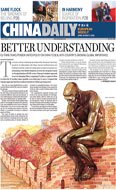Center
Taxing times mean changes
Updated: 2011-05-04 07:58
By Jia Kang (China Daily)
Currently, China's fiscal and taxation system is heavily tilted to the central government, with local governments entitled to a smaller share of fiscal revenues. As a result, the fiscal resources of local governments remain inadequate and they are incapable of exercising their administrative responsibilities. Undoubtedly, a fiscal power proportionate to their administrative duties would provide an important fiscal guarantee for local governments to effectively fulfill their administrative functions, especially with regard to education, healthcare, infrastructure construction and social security.
The country needs to try and expand its tax sources in a bid to consolidate its fiscal foundation. The central government should only collect such revenues as personal income tax, consumption tax, and customs tariffs, while local governments should receive the revenues from property taxes.
The effects of the property taxes piloted in Chongqing and Shanghai in early 2011 are yet to be seen. If they prove effective, such property taxes could constitute the main tax source for local governments. In addition, the feasibility of a business tax, an urban construction tax and a resource tax should be studied and implemented as important tax sources for local governments.
Given that China's resources are mainly distributed in the less-developed central and western regions, the adoption of a resource tax would increase the coffers of these regions. Moreover, it could be used to promote the conservation of resources and environmental protection.
To develop itself into an innovative nation, China should also try to boost its capability for innovation and advance its long-sluggish industrial restructuring and transformation of the national economic growth mode. An improved innovation capability would also help conserve resources and build an environmentally friendly society.
To this end, China should try to build a public fiscal system that is beneficial to innovation activities at the national or enterprise levels. For example, more preferential tax policies could be adopted to encourage and stimulate enterprises to strengthen research aimed at boosting their capability for innovation.
Putting in place a reasonable environment and resource tax would help form a solid foundation for the country's bid to transform its current and long-controversial development model. That calls for a reasonable incentive and punishment mechanism to be adopted for the exploration and mining of the country's mineral ores and other resources.
The author is director of the Research Institute for Fiscal Science of the Ministry of Finance. The article first appeared in the magazine China Development Observation.
(China Daily 05/04/2011 page8)
E-paper

Head on
Chinese household care goods producers eye big cities, once stronghold of multinational players
Carving out a spot
Back onto center stage
The Chinese recipe
Specials

Bin Laden dead
The world's most wanted man was killed in a US raid in Pakistan.

British Royal Wedding
Full coverage of the royal wedding of Prince William and Kate Middleton in London. Best wishes

The final frontier
Xinjiang is a mysterious land of extremes that never falls to fascinate.
